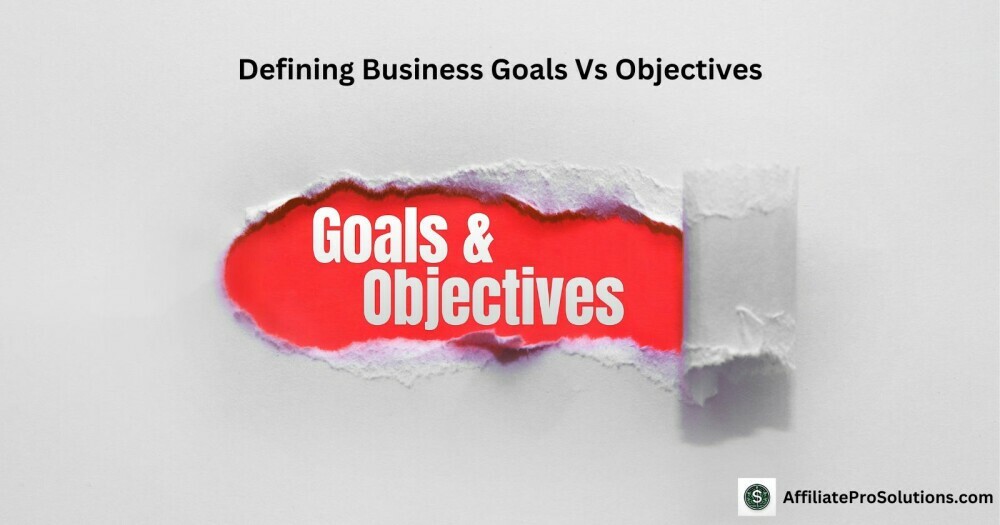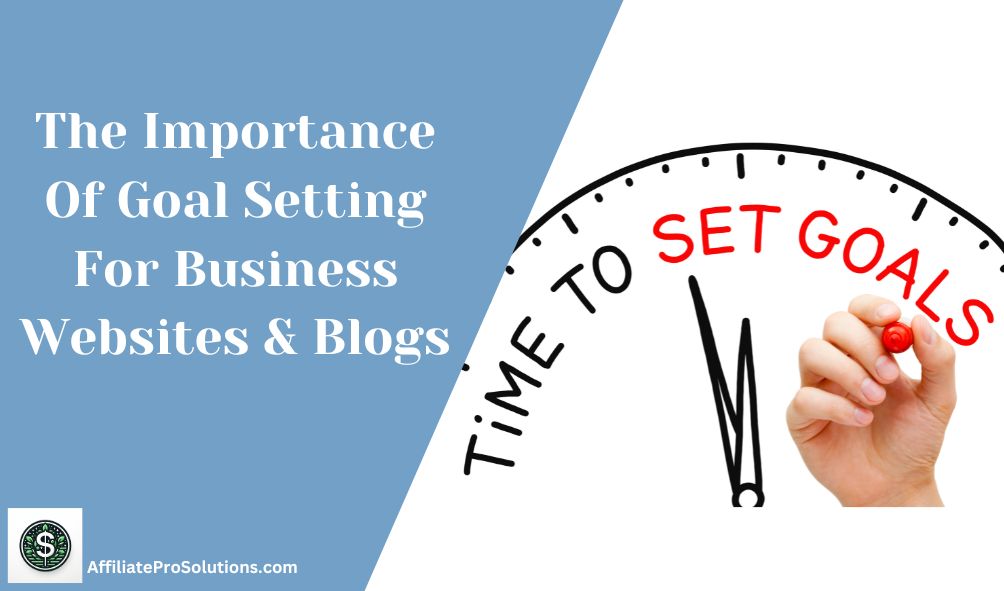Topic – Business Management
Post Reading Time – 10 Minutes
If your business website or blog isn’t performing the way you had hoped, it’s probably because you’re missing one very important step, and that is clear goal setting. The importance of goal setting for business is an absolute must and it’s what helps you focus, measure your success, and avoid wasting time on what doesn’t work. Let’s look at how to get it right and start seeing the results you want.
Carrying Out Goal Setting For Business
Setting out clear goals is very important for achieving success in any business. Having goals gives you a clear sense of direction, keeps your efforts focused, and helps you track your progress. By setting them out clearly, you can identify potential challenges early on, change things when needed, and make sure every action you take contributes to your objectives.
This is a must for building a business that grows steadily and stays competitive, even in difficult markets.
See Your Full Goal Setting Checklist Here!
What You’ll Learn From This Post
- How Clear Goals Drive Your Business Success – Learn why setting up defined goals keeps your efforts focused and helps you measure your progress more easily.
- Ways To Overcome Common Challenges – See some strategies to address some issues like limited resources and market changes.
- The Difference Between Goals And Objectives – Understand how goals set your direction and your objectives provide the steps to achieve them.
- Using Metrics To Track Progress – Find out how to connect your goals with measurable indicators to make sure you have success.
- Why Regular Updates Are Important – Learn how revisiting and making changes to your goals can keep your business relevant and growing.

Start Your Training
- Build Your Website & Earn Revenue
- Support, Tools & Training Included
- Complete with Business HUB
- Artificial Intelligence Writers
- My Personal Support
- No Risk Free Starter Account
Setting out clear goals is one of the most reliable ways to handle the uncertainties that come with running a business.
With well defined goals, you can spot and deal with any potential risks early. The business world requires you to have focus and flexibility, and clear goals help make sure you stay on track.
Goals also give you a clear way to measure your performance. By tracking your progress, you can see how your business is performing and make changes to the areas that need improvement.
So, in short, having clear goals helps you keep your business on track, monitor its progress, and make sure everything stays running smoothly.

Overcoming Challenges In Goal Setting For Business Success
Before we continue, I want to quickly mention something that doesn’t always get enough attention when it comes to setting business goals, and these are the challenges that people face.
Here’s a surprising fact I came across.
90% of senior executives admit that their companies often fall short of achieving their goals. That’s a big gap, and I think we have to ask, why does this happen?
The truth is, many businesses struggle with implementing their goals effectively. This can be due to obstacles like limited resources, unexpected market changes, or just a lack of clarity in the planning process.
Without addressing these issues, even the best intentions can go off course.
Yes, it’s important to set ambitious goals, but they need to be realistic too. Aim high, but be careful not to create targets that are so far out of reach that they set you up for failure.
One way to stay on course is to make goal setting an ongoing thing. This includes regularly reviewing your goals, being flexible enough to make some changes when you think they are needed, and having a culture that supports staying focused and adaptable.
It needs to be a continuous effort that requires your attention and adjustments as your business grows and changes.
Now we understand this, let’s look at the difference between business goals and objectives and why understanding both is important to building successful strategies.

The Importance Of Defining Goals And Objectives For Business
Goals and objectives are two of the terms that get used a lot in business, but they aren’t the same. Understanding the importance of goal setting for business is essential here, as each of these plays a crucial role in your business’s success.
Goals are the big picture. The overall outcomes you want to achieve.
Objectives, on the other hand, are the steps you must take to reach those goals. They’re specific and they require you to take action, making it clear what needs to be done.
Here’s an example.
A goal could be “Be the top provider of online fitness programs for busy parents by 2027.”
An objective supporting that goal might be “Develop and release ten new 30 minute workout plans in the next six months.”
Can you see the difference? Goals are broad and inspiring, while the objectives are focused and detailed.
As your business grows or your industry changes, you’ll need to go back over your goals and objectives. It’s completely fine to change them as needed to stay relevant and keep moving forward.
Goals show you what you’re working toward, and objectives make sure you’re actually getting there.
Next, we’ll talk about connecting your goals to Key Performance Indicators (KPIs) so you can measure your progress and make sure your efforts are paying off.

How Goal Setting For Business Connects To Performance Metrics
As we have said, setting goals is important, but those goals need to be tied to measurable results, and this is where Key Performance Indicators (KPIs) come into it.
KPIs give you a way to see if your business is running on the right track.
If you’ve ever wondered how to connect your goals to your strategy, tools like strategy maps can help you. They make it easier to see how your objectives link together across different parts of your business.
Balanced scorecards can also be useful, especially if you want to look at more than financial numbers and they include things like customer satisfaction and team performance.
Additional Business Management Info & Resources
Goals by themselves aren’t enough. If they’re not connected to the right KPIs, you might be putting in a lot of work but not making the progress you need.
To avoid this, take a step back and ask how each goal benefits your business and what you can measure to track its success.
This applies to every business, no matter the size or the industry it’s in. Goals should be specific, measurable, and tied to indicators that show actual progress.
When you connect your goals to KPIs, everyone in your business, from managers to team members, can see how their work makes a difference.
Once you’ve done this, the next step is to keep building on your progress and concentrate on the long term.

Goal Setting for Resilience and Growth
Setting goals is a process that requires your ongoing attention, adaptability, and a willingness to keep learning.
Here’s why it’s important to think about different areas of your business when setting your goals for sustainable growth.
Financial Goals
For most businesses, financial goals are often at the top of the list. These might include cutting unnecessary costs, trying to increase revenue, or managing cash flow more effectively.
It’s important to concentrate on goals that strengthen your business’s financial position while at the same time helping you stand out over your competitors.
Customer Satisfaction
Keeping your customers happy is a must for your long term success. Don’t just run after the short term gains at the expense of customer trust or satisfaction.
Instead, concentrate on understanding your customers’ needs and offering products or services that solve their problems. Tracking customer satisfaction will help you stay relevant and responsive.
Other Important Areas
Except finances and customer satisfaction, it’s also a good idea to have clear goals around innovation, managing your team, and staying compliant with regulations.
Keeping up with changes, whether they involve regulations or your customer needs, helps you respond effectively. Planning ahead allows you to handle challenges and turn them into opportunities to make improvements.
Your Goal Setting Checklist

Here’s a checklist to help you set and achieve your business goals.
| Set Clear Goals And Objectives | Write down goals that are specific, measurable, and achievable. Break them into actionable steps to keep you on track. |
| Connect Your Goals To KPIs | Pick KPIs that match each goal so you can track progress and measure success effectively. |
| Review Your Goals Regularly | Check your goals every quarter to see what’s working, make changes where needed, and keep up with any business or market shifts. |
| Plan For Challenges Early | Spot potential obstacles ahead of time and create strategies to handle them before they become problems. |
| Share Your Goals With Your Team | If you have a team, explain your goals, why they matter, and invite feedback to keep everyone on the same page and motivated. |

Frequently Asked Questions – FAQs
Read these important questions which are often asked with regards to setting and achieving goals.
What is the difference between a business goal and a business objective?
A goal is a broad outcome you aim to achieve, while an objective is a specific, measurable step to reach that goal. Goals set the direction, and objectives outline the actions to take.
Why is it important to connect goals to KPIs?
Tying goals to Key Performance Indicators (KPIs) helps you measure your progress and ensure your efforts are focused on what matters most to your business’s success.
How often should business goals be reviewed?
It’s a good idea to review your goals every quarter. This helps you keep them relevant and in line with changes in your business or industry.
What challenges make it hard to achieve business goals?
Some common challenges include limited resources, unexpected market changes, unclear goals, and low employee engagement. Addressing these early makes it easier to stay on track.
How can a company set goals effectively?
Focus on creating clear, measurable goals. Review and update them regularly, communicate them with your team, and make sure everyone’s efforts meet with the overall objectives.
Finally
What happens if things don’t go as planned?
It’s important to remember that setbacks and unwanted issues are all part of business. By learning from what didn’t work, you can change things and make improvements as you move forward.
Think of these challenges as opportunities to make things better. Every strategy you try teaches you something, even if it doesn’t deliver the results you expected.
How Planning Improved My Website’s Performance
Back in the early days of running my website, when I didn’t understand the importance of goal setting for business, I would just jump straight into writing my content without much of a plan. I didn’t have daily or weekly goals, and yes, my content quality improved over time, but I realized other parts of my website were being left behind. Things like updates, SEO changes, and audience engagement weren’t getting the attention they needed.
That’s why I now include a checklist in most of my content. Having a clear plan has made it so much easier to manage my tasks and stay on top of everything. It’s a simple change that’s helped me stay organized and keep my website running smoothly. You live and learn!
So, take some time to look at your business goals. Make sure they have a balance between your financial goals, customer needs, and efficient operations. These are all connected and essential for your success.
By approaching your goals this way, you’ll be ready to take advantage of any opportunities when they come your way.
Thank you and please leave your thoughts and comments below.
Chris
Wealthy Affiliate
This is where my journey into the online world began, and it’s still the only community I trust for genuine, high quality guidance on building a business and earning money online.

The Wealthy Affiliate platform offers everything you need – training, hosting, tools, resources, and live assistance – all in one place.
If you’re ready to start your online business, this is the perfect place to begin.
I highly recommend Wealthy Affiliate for its unmatched support and resources.
About Chris Towers – Follow Me

My name is Chris Towers, and I’m here to help you make sense of affiliate marketing and build an online income. Through years of experience, I’ve learned what works, and I want to share those lessons here to help you succeed.
Related
- The 80 20 Rule For Time Management – Get More Done
- Time Management Tips For Working At Home – Get More Done
- What Is The 80 20 Rule About? – Learn How to Apply It
- The Importance Of Goal Setting For Business Websites & Blogs
Just to be open with you – My site includes links that are part of affiliate programs. If you click on these links and buy something, I might get a small commission. There’s no additional cost for you whatsoever. It’s a simple way to support the content I create for you. I hope you are OK with this & thank you for your understanding.





It is super important to set goals for your business, otherwise, you just amble along without any clear path on where you are going to end up. You are correct in saying setting goals is a system that helps keep your company’s health in check, one goal at a time.
They say when setting your goals you always need to start at the end and work backwards so that you can track the steps you need to take to get there. What do you think about this suggestion?
HI Michel
I can completely agree with you that starting with the end in mind and working backwards could be an effective strategy for setting goals.
It allows you to envision the final outcome and see out the necessary steps to get there.
This reverse engineering of goals can not only clarify your path but can also help you in identifying potential challenges and milestones along the way.
It’s a well structured approach that can enhance your strategic planning and keep you in check with your long term objectives.
What specific goals are you thinking about setting for your business? Let me know if you need anything. I’ll be glad to help.
Thanks
Hello Chris,
I really enjoyed reading your post and I think that it included tons of educational information.
I think a really interesting question to ask people is “What was your best failure in business?” Anyone who is interested in learning some valuable strategies and goal setting techniques will be so pleased to view this post.
It’s apparent that you puts lots of time and care into preparing this and I for one would like to thank you and to let you know that I will be checking out more of your posts.
Cheers, Stacey
Hi Stacy
First off thank you for reading and for your kind words. I’m happy to hear that you found the post educational.
Asking about someone’s “best failure” is for sure a fascinating question because it highlights the invaluable lessons learned from experiences that didn’t go as planned in the first place.
Sharing these stories can provide practical assistance and encourage others in their journey.
I really appreciate your feedback and support, and I look forward to sharing more posts that hopefully will be just as helpful to you!
Thanks
Chris